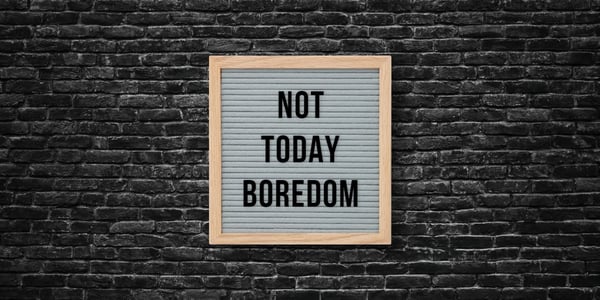Boredom is a feeling people with ADHD know all too well. Writing emails seems like an impossible task and looking at (someone else’s) spreadsheet feels mind-numbing. An ADHD brain wants immediate relief from boredom and will chase it at the expense of your priorities.
Fortunately, we have advice on how to make even the most boring tasks a little easier.
Too long; didn’t read
- Boredom is a common experience for ADHDers, but it is not a symptom of ADHD.
- Dopamine deficiency in ADHD impacts interest and fulfillment in tasks and can lead to prioritizing immediate relief over tasks.
- You can stay engaged by introducing novelty into tasks, shifting your mindset, involving other people in the task, and six more ideas.
Is boredom a symptom of ADHD?
Boredom - and boredom intolerance - is a result of ADHD; not a symptom. And it’s most likely related to dopamine.
Boredom and dopamine
Dopamine is the feel-good hormone that helps people create habits and stay motivated. Unfortunately, ADHDers typically have lower levels of dopamine, impacting our ability to stay interested in tasks. Consequently, people with ADHD don’t get the same fulfillment from completing tasks.
And unfortunately, it doesn’t matter what your intellectual values are, either. If your brain hasn't had a charge of dopamine in a while, it won’t matter how much you care about your friend's breakup story—you'll feel bored anyway.
Boredom can lead to isolation

Something doesn’t need to be inherently boring for an ADHD brain to want to quit it. An ADHD brain can suddenly decide it’s bored of a class in your chosen major, a job you worked hard to get, or even a romantic relationship.
Boredom and understimulation might cause you to do embarrassing things, like interrupting or intruding on other people’s conversations. It can look like mindlessly checking social media when you shouldn’t be and the app’s music starts blasting, outing you as being totally checked out. It can even be losing interest in your significant other, even when you love them dearly.
Maybe these behaviors frustrate people around you or embarrass you enough to feel annoying or rejected. Acting out because you’re bored or behaving in a way you don’t like is frustrating. These feelings can lead to social anxiety, rejection sensitive dysphoria, and entirely avoiding social situations.
Recognize the signs of isolation
The first step is to recognize when you’re bored. Haven’t been productive in an hour? Are you scrolling when you shouldn’t be? Did you zone out in the middle of your friend’s break-up story? Self-awareness and identifying boredom is the first step toward personal growth and change.
There are three clinical diagnostic types of ADHD. Fixing your boredom requires knowing which type you are.
Inattentive: losing focus, forgetting details, daydreaming
Hyperactive-impulsive: anything seems more interesting than what you’re ‘supposed’ to be doing; feeling physically ‘on the go’
Combined: a combination of the above
Chronic boredom affects your lifestyle
When someone with ADHD is bored, they may lean on destructive behaviors to satisfy their boredom. Awareness of these unhealthy tendencies can help avoid them.

Are you avoiding boredom with unhealthy lifestyle choices?
These are four common unhealthy lifestyle choices people often make in order to avoid boredom. If you see yourself in one or more of these, you can find healthier suggestions below.
1. Getting emotional
As ADHDers, we're prone to emotional dysregulation. Not to mention, negative emotions - like anger - stimulate the brain due to increased adrenaline production1, increasing heart rate, blood pressure, and brain activity.
2. Cycling through toxic relationships
Some people with ADHD fall victim to toxic relationships due to intense highs and lows of fighting, and then making up.
3. Compulsive behaviors
People with ADHD have a higher likelihood of addictions like drugs, alcohol, or even food, which manifests as compulsive drug and alcohol use, and binge-eating. This easy dopamine hit soothes the ADHD brain, but at a dangerous cost.
4. Mobile device addiction
So much of social media now is short-form video. Giving your brain dopamine hits on demand makes it feel impossible to be satisfied by finishing those expense reports. Log all the way out of distracting apps and move the icons somewhere that will take an extra second to access. Even a slight delay in gratification can help break the cycle.
How to make boring tasks less boring
The following suggestions won't work perfectly for everyone, so keep in mind that you can adjust the tips below to suit your (healthier) lifestyle.
1. Pair your boring tasks with your favorite elements
Think about things you’re passionate about, or what kinds of activities always seem to boost your mood. What elements make them interesting?
Examples of task elements:
- Problem-solving
- Time limits or speed
- Certain colors or tones
- Suspense and thrill
- Hands-on engagement
- Humor
- Rhythm or sounds
- Risk or uncertainty
For example, If one of your favorite elements is rhythm or sounds, listen to instrumental electronic music while you work on boring tasks.
2. Make it new (to you)
Everyone is different, but a common denominator of fighting boredom is novelty and experiencing things in a new way. Changing up your most tedious tasks can make them feel more tolerable.
Here are some revision examples:
- Can’t do the dishes? Buy a fun new sponge and good-smelling soap. (Lots of ADHDers love Scrub Daddy sponges and Dawn Power Wash)
- Change your computer background so today doesn’t feel like a continuation of yesterday
- If you work from home, mix it up by working outside or sit at a different table
- Fidget toys are great for times you need to sit still and listen
- Reward yourself when tasks are complete (or even before!)
- Create games for yourself, like completing your tasks in an allotted amount of time (AKA gamification)
3. Do a stimulating activity before the boring task
It sounds counterproductive, but hear me out! If you're already dreading the boring task before you start it, your ADHD brain doesn't stand a chance at task completion. Instead, engage in a quick stimulating activity to shift your mindset from a 'doom-and-gloom' state, to 'engaged and positive'.
Ideas for quick mindset-shift activities:
- Puzzles, mazes, and brain teasers
- One round of Beat Saber on a VR headset (or any other game that gets you moving)
- Listening to an ADHD podcast
- Cold showers
- Listening to today's stream on the Inflow app
You can also focus on completing small, achievable goals, like making your bed or watering that dying plant on the counter. (That gets dopamine flowing, too!)
4. Do the task with someone else.
Whether you're working with a body double to help you stay on task (or with a friend to stay social), working with another person is a good way to keep boredom away.
Want to try body doubling? The Inflow app has coworking sessions and focus rooms to help you stay productive! Get started with Inflow today!
5. Make it fun (great for inattentive types)
For whatever reason, I find it impossible to send emails. I found that the best way to reply to emails is to first write a silly, unprofessional version of what I need to say, but in a space completely outside of where I usually send emails - like a word document. I rewrite it once I’m interested in the topic again.
You can even make it rhyme or write it into a poem. No matter how you do it, making it fun will make it tolerable.
6. Do it as soon as possible
Your willpower (and medication) will dissipate as the day goes on. Do your least favorite tasks right after you take your medication—or whenever you usually feel the most productive—to make sure they get done.
7. Get moving (great for hyperactive types)
Walk around while on a work call and see how you feel. Some people with ADHD find that exercising while completing work responsibilities lets them think more clearly.
Try using an under-desk walking treadmill or sitting on an exercise ball while you work.
8. Eliminate other distractions
Of course, work feels incredibly boring when your favorite things are five feet away! Try to work in a distraction-free zone but somewhere with the right amount of stimuli. Some ADHDers find working in a coffee shop or isolated library cube is exactly what they need.
9. Make a “to-don’t” list (great for impulsive types!)
A personal favorite method to prevent distraction is something I call a “to-don’t” list.
Keep a pad of paper near you as you work. Every time you have an impulse to get up and do something, write it down. If your ADHD is anything like mine, by the end of the day you’ll have a hilarious list of things you thought were really important at the time.
How to tolerate boredom (when you have to)
Sometimes you’re bored and there’s nothing you can do about it! Here are methods to stick it out.

1. Forced focus
Boring assignment that's due at midnight?
Start with the part of the assignment that you like. Even if you think you hate the whole thing, there must be some aspect of it that you hate a little less. Finding mental focus during dull moments can help use your time constructively.
2. Mindfulness
Focus on your thoughts as they happen or turn your attention to your breath. Don’t worry if you can’t fully quiet your brain. Mindfulness is called a practice for a reason!
You might be surprised how honed in your attention can become after a brief meditation or mindfulness session.
3. Maladaptive daydreaming
Have you ever had a shower thought?! You know, those huge life epiphanies that happen when you’re taking a shower?
It turns out that brilliant shower thoughts happen because we relax our brains and allow them to wander. Performing a ritual you know as well as your shower routine allows your brain to daydream and come up with some pretty interesting stuff. When doing a boring task like folding laundry or washing the dishes, lean into your imagination.
You never know what you’ll come up with.






.jpg)

